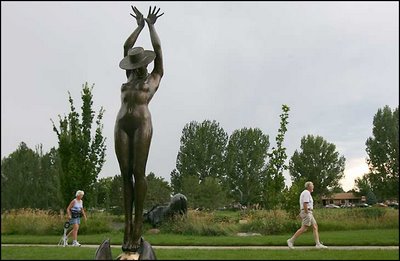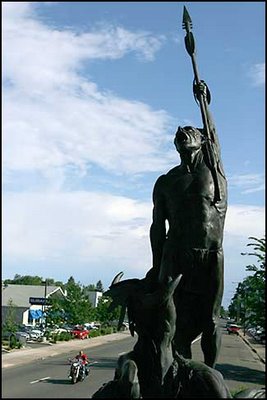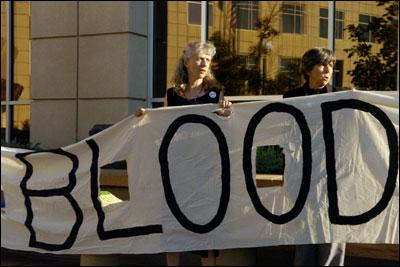Some Dems have begun to understand that effete, elite liberals, anti-war peaceniks, hippies, activists, and other assorted leftist candidates can't win general elections, no matter how much the opponent is hated, or the country divided:
Washington - Centrist Democrats, many of whom will gather in Denver this weekend, reckon that their party's route back to power runs through Douglas County and other exurban landscapes.
Members of the centrist Democratic Leadership Council know President Bush captured Douglas and another 96 of the 100 fastest-growing U.S. counties in 2004 on his way to trouncing Sen. John Kerry among churchgoing, white parents.
So Democratic analysts are studying Sen. Ken Salazar's victorious Colorado campaign, which shrank GOP margins in Douglas and other fast-growing counties, as a potential template for a party comeback in 2006 and 2008.
Sen. Ken Salazar, who was successful against Pete Coors in 2004 has become--for some--their template, bucking the Titanic-like disaster that was the 2004 Democratic Party and providing one of the few highlights on an otherwise dismal night.
Salazar won Colorado, as Kerry lost the state, because the Senate candidate's statewide total vote "exceeded Kerry's by 79,456," writes DLC strategist Ed Kilgore in a study conducted with analyst Mark Gersh of the National Committee for an Effective Congress.
In the state's fastest-growing counties - Douglas, Weld, Larimer and El Paso - Salazar outperformed Kerry by 46,832 votes, the DLC analysis notes, although Salazar trailed Republican Pete Coors in all but Larimer.
The Kerry campaign turned out thousands of new voters in the nation's big cities, mature suburbs and college towns. But the party's liberal and minority base is no longer large enough to compensate for its losses where America is growing fastest.
"No Democrat in modern history captured a greater percentage of both self-identified liberals and registered Democrats than Kerry, yet he lost," strategists William Galston and Elaine Kamarck noted in a study last fall for Third Way, another centrist group.
Salazar's campaign, like those run by Democratic governors Tim Kaine of Virginia and Mike Easley of North Carolina, took a centrist message to exurbs that appealed to independents, moderates and conservatives. Salazar "placed special emphasis on his law enforcement experience, his national security views, and his mainstream cultural values," Gersh and Kilgore noted.
Not all, however, embrace Salazar's centrism, and like those supporting Ned Lamont's campaign against incumbent Joe Lieberman in Connecticut, the stake are more than winning campaigns, it is about enforcing ideological conformity:
Not all Democrats share the vision of the DLC, which begins its annual "National Conversation" meeting Saturday in Denver. Many liberal bloggers and Democratic activists believe ideological mushiness is the cause of the party's woes. They see groups such as the DLC as GOP "enablers."
Democrats should not "provide a lot of cover for the Bush agenda," said Connecticut senatorial candidate Ned Lamont, whose anti-war campaign has shaken moderate, pro-war Sen. Joe Lieberman's hopes for re-election.
Democratic candidates have won the popular vote in three of the last four presidential contests and turned California from red to blue. But without a majority in either house of Congress, and with Republicans governing marquee states such as California, Texas, New York, Ohio and Florida, the party is short on national leaders and influence.
"Democrats are underperforming," wrote consultant James Carville and pollster Stan Greenberg in a memo last month to fellow Democrats. Voters, they said, are "unsure about what Democrats stand for."
Apparently, Sens. Salazar and Lieberman give "cover" to the Bush agenda (check their voting records, they are doing nothing of the kind) while opposing leftwing moonbats like Lamont and Howard Dean from completely submerging the Democratic party in inefficacy at the polls, inadequacy in message, and intolerance in ideological viewpoints.
The MSM continues to spout the "popular vote" meme, as if that had any validity other than providing them with numbers to crunch on election night (and anyway, Bush won the "popular" vote in 2004, much to their consternation). They have no leaders or influence because their "leaders" have no message, as none other than James Carville points out. We all know what they stand against, but in the final analysis, what the hell are they for?
In fact, in spite of Bush's sagging poll numbers and the GOP's inconstant hold on public opinion--which is like nailing jelly to the wall--the Dems are flailing in the overall "capture the constituency" contest:
Ominously for the party, key voting groups are moving in a Republican direction, analyst Gersh said. Between Bill Clinton's win in 1996 and Kerry's loss in 2004, Democratic presidential candidates lost ground among women, high school graduates, Catholics and seniors.
"Among Hispanics, whom Democratic strategists have pursued obsessively, there has been an even more precipitous decline," said Gersh.
Clinton's 51 percentage point margin among Latinos was reduced to an 11-point advantage for Kerry in 2004.
"The map is wholly going in the direction of the Republicans," said Karl Rove, Bush's top political adviser. For the Democrats, "the Solid South is now gone, the Midwest is increasingly problematic for them" and "certain parts of the West are reliably Republican."
Certainly anything can change in an election, and political winds can blow in the opposite direction overnight (Hurricane Katrina, anyone), but a tidal shift toward Democratic candidates, especially those espousing Daily Kos-like leftist pabulum will not get far, as the Dems begin to lose their most cherished voting blocs, the "minority vote":
Many Democrats believe that changing demographics will give the party a natural majority. Last year, Texas joined California, New Mexico and Hawaii on the list of states that have more minority than white residents. But Texas' governor, its two U.S. senators and attorney general, and majorities of the state's legislature and congressional delegation are Republican.
"Democrats cannot expect demography to turn red areas blue in the immediate future," said Kilgore.
Democrats can hope that punitive Republican immigration policies will hurt the GOP among Hispanic voters, Rove said. It is something he and other GOP strategists worry about. But liberals should remember, he added, that "there is an inherent conservatism in the Latino community" on such matters as faith, family and military service.
So Salazar has become the alternate "paradigm", one that might actually garner more interest, but also potentially threatens to alienate the far-left radicals like Cindy Sheehan, the Kostards, and conspiracy theory/moonbat crowd:
And so the party looks to candidates such as Salazar and Kaine, who carried Republican suburbs and exurbs in northern Virginia last fall, for new approaches.
"Democratic field operations will have to venture into areas where they feel less comfortable and where finding Democratic votes takes a bit more effort," said Democratic strategist Ruy Teixeira.
"Ken was ... the only Democrat to win (an open) Senate seat in a state George Bush won," said Salazar's 2004 campaign director, Jim Carpenter. "There are a variety of lessons Democrats around the country can learn."
Carpenter said Democrats should emulate Salazar's moderation and independence, "talk about issues that impact people in their everyday life" and "not cede any territory" to the GOP.
Lessons the Democrats should learn from Salazar's victory in 2004:
If you talk like an elite, New England blowhard surrounded by wealth, dithering on foreign policy, and putting forth no platform other than "I oppose my opponent", you are not going to win.
If you sound/resemble/support/associate with people like Sheehan, Michael Moore, Hollywood liberals and the like, you are not going to win.
If your main supporter is the Daily Kos, withdraw immediately, you are definitely not going to win.


















